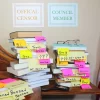The United States Court of Appeals for the Fifth Circuit ruled last week that plaintiffs cannot “invoke a right to receive information to challenge a library’s removal of books.”
The ruling came Friday after a federal judge initially granted a preliminary injunction to plaintiffs who sued Llano County over the removal of 17 books from the library.
A three-judge panel of the Fifth Circuit later reinforced that injunction 2-1, with conservative circuit judge Stuart Kyle Duncan dissenting. A month later, the Fifth Circuit vacated its decision and scheduled an en banc hearing — in front of the full court — in September 2024.
In a 60-page majority opinion on May 23, written by Duncan, 10 members of the Fifth Circuit agreed that “plaintiffs cannot invoke a right to receive information to challenge a library’s removal of books.”
As part of that opinion, the majority overruled the circuit court’s own precedent in Campbell v. St. Tammany Parish School Board, a 1995 First Amendment case in which a school board removed a book on voodoo from school libraries in a Louisiana parish. The judges wrote in their opinion that the 30-year-old precedent “was based on a mistaken reading of precedent” and “wrongly decided.”
Seven judges led by judge Stephen A. Higginson filed a 36-page dissent criticizing the majority opinion’s treatment of the precedent.
“Today, a majority of our court sanctions government censorship in every section of every public library in our circuit,” the dissenting judges write. “As counsel for Defendants acknowledged in oral argument, there is nothing to stop government officials from removing from a public library every book referencing women’s suffrage, our country’s civil rights triumphs, the benefits of firearms ownership, the dangers of communism, or, indeed, the protections of the First Amendment.”
The majority opinion took a derisive tone about the plaintiffs’ arguments, calling them “over-caffeinated.”
“We note with amusement (and some dismay) the unusually over-caffeinated arguments made in this case,” the majority wrote. “Judging from the rhetoric in the briefs, one would think Llano County had planned to stage a book burning in front of the library.” As an example, “one amicus intones, ‘Where they burn books, they will ultimately burn people.’ Take a deep breath, everyone. No one is banning (or burning) books.”
The dissenting judges took issue with that tone.
“The majority—apparently ‘amuse[d]’ by expressions of concern regarding government censorship—disparages such concerns as ‘over-caffeinated’ because, if a library patron cannot find a particular book in their local public library, they can simply buy it,” the judges write. “This response is both disturbingly flippant and legally unsound. First, as should be obvious, libraries provide critical access to books and other materials for many Americans who cannot afford to buy every book that draws their interest, and recent history demonstrates that public libraries easily become the sites of frightful government censorship.”
APLS officials already touting the decision
That decision is already being touted by board members leading the Alabama Public Library Service, although Alabama falls in the 11th circuit, not the Fifth.
“It’s so common sense, no library has every book that has ever been written,” Wahl told Jeff Poor on the Jeff Poor Show Tuesday. “Every library has to choose which books are in its collections and which are not. This is not book banning, this is not book burning. This is literally just deciding what is most edifying, what is most beneficial for our readers … This is not about politics, this is about what is best for our children and what is best that we put in front of them.”
Wahl also said it would allow libraries to “let children be children again” and “not push a social agenda or sexualization on them.”
APLS board member Amy Minton sent the ruling to APR and stated that it is her “strong position … that we need to ‘weed out’- remove, any books that encourage going against Alabama State law and Federal Executive Order.”
“You know this has been my position since I first spoke to you 2 years ago and I have not changed,” Minton wrote in a text to APR. “Truly loving others is standing up for truth. The reason I take this stand is because I genuinely love everyone who struggles with gender or body dysphoria and I don’t want them to accept something that isn’t even settled science! I certainly don’t think tax dollars should pay for books that encourage ideas against Alabama State Laws as well as put Alabama at risk of losing $3 million dollars of federal funds!”
Minton cited Alabama’s recently passed “What is a Woman Act,” also known as the “Trans Erasure Act” by critics, and alluded to President Donald Trump’s executive order requiring that no federal funds be used to promote gender ideology. Minton cites these more extensively in a document she introduced at the May APLS board meeting seeking to deem all books that promote the idea of gender transition as “inappropriate” under APLS code.
Contradicting circuit rulings impact Prattville library suit
The decision by the Fifth Circuit bolsters the argument put forward by attorney Bryan Taylor representing the Autauga-Prattville Public Library against a lawsuit filed by patrons including members of Read Freely Alabama and the Alabama Library Association. Taylor cited Duncan’s dissent as support for the library’s position that patrons cannot challenge the library’s removal of books, which is only strengthened by the court’s en banc decision to follow Duncan’s lead.
The Fifth Circuit does not operate in a vacuum, however, and other circuit courts have taken an opposing stance to its decision.
Read Freely Alabama recently filed its own notice in the court record advising the court of a decision in th e10th Circuit granting a preliminary injunction agains the removal of books in a Colorado school library.
In Crookshanks et al. v. Elizabeth School District, a federal judge granted a preliminary injunction to the plaintiffs who argued the school system had violated students’ first amendment rights by removing books due to “sensitive” and political topics.
“In granting a preliminary injunction that prohibits the removal of library books, the Crookshanks court concluded that defendants’ ‘argument—that its decisions as to the library contents are government speech immune from First Amendment scrutiny—finds little support in the caselaw,’” counsel for Read Freely wrote in a filing in the suit on May 8. “The court therefore ‘reject[ed] the [defendant’s] invitation to extend government-speech precedents . . . something the Supreme Court has expressly discouraged.’ As the court explained, ‘[n]o one would seriously argue that placing [Mein Kampf] in a school library constitutes government speech.‘”
The government speech argument
Seven of the 10 judges in the majority joined the opinion that library books are “government speech,” which is not a majority of the 17 judges ruling on the case.
In that opinion, the seven judges wrote that “libraries curate their collections for expressive purposes” and “their collection decisions are therefore government speech.”
It’s an argument that attorney for the Autauga-Prattville Public Library have followed, despite other circuits rejecting the idea at various levels.
The Eight Circuit Court of Appeals recently ruled against the idea that library collections are government speech.
“Contrary to Defendants’ contention, the Supreme Court has not extended the government speech doctrine to the placement and removal of books in public school libraries,” the appeals court decisions reads, adding that “it is doubtful that the public would view the placement and removal of books in public school libraries” as the government speaking.
“Take routine examples of historic tomes on political science. A well-appointed school library could include copies of Plato’s The Republic, Machiavelli’s The Prince, Thomas Hobbes’ Leviathan, Karl Marx and Freidrich Engels’ Das Kapital, Adolph Hitler’s Mein Kampf, and Alexis de Tocqueville’s Democracy in America,” the court continued. “As Plaintiffs noted, if placing these books on the shelf of public school libraries constitutes government speech, the State ‘is babbling prodigiously and incoherently.'”
A federal judge in Florida, which is part of the 11th Circuit with Alabama, flatly dismissed the argument made by the state that library collections are government speech.
“… the fact that the traditional purpose of a library is to provide information on a broad range of subjects and viewpoints, the court simply fails to see how any reasonable person would view the contents of the school library (or any library for that matter) as the government’s endorsement of the views expressed in the books on the library’s shelves,” U.S, District Judge Keith Wenterell wrote in his ruling. “… the speech embodied in a library collection is materially different from the speech embodied in government-sponsored parades, prayers, art exhibits, and monuments on public property.”



















































